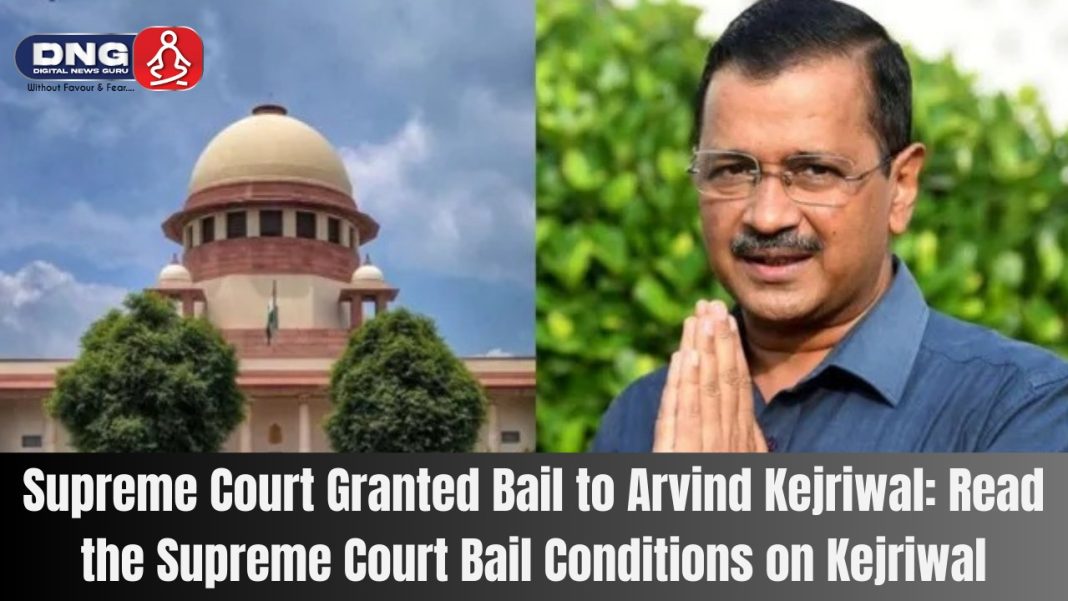DIGITAL NEWS GURU DELHI DESK:
Supreme Court Granted Bail to Arvind Kejriwal: Read the Supreme Court Bail Conditions on Kejriwal
In a significant legal development on September 13, 2024, the Supreme Court of India granted bail to Delhi Chief Minister Arvind Kejriwal in connection with the Delhi excise policy case.
This case has been a focal point of political and legal drama for months, with the Aam Aadmi Party (AAP) leader facing serious allegations of corruption and money laundering.
The apex court’s decision to grant bail marks a critical moment for Kejriwal, who has been in custody for nearly six months. While his release is a relief for his party and supporters, the bail comes with strict conditions, reflecting the serious nature of the allegations. This article delves into the specifics of the conditions imposed by the Supreme Court, the legal and political implications, and what lies ahead for Kejriwal and AAP.
The Case Against Kejriwal: Overview of the Delhi Excise Policy Scandal
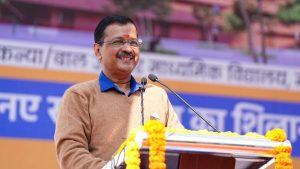
The Delhi excise policy scandal revolves around accusations that Kejriwal and his administration manipulated the process for awarding liquor licenses under a new policy introduced in 2021. The policy aimed to increase state revenues through the privatization of the liquor business in Delhi. However, it quickly became controversial, with investigative agencies like the Central Bureau of Investigation (CBI) and the Enforcement Directorate (ED) alleging that Kejriwal’s government received kickbacks from certain private entities in exchange for favorable contracts.
According to the prosecution, Kejriwal and his associates were involved in a scheme that allegedly funneled 100 crore in illicit funds into the Aam Aadmi Party’s election campaigns, including for the 2022 Goa Assembly election. These funds were reportedly received from a “South Group,” which included politicians and business figures. Kejriwal’s former deputy, Manish Sisodia, was also arrested and is facing similar charges. While several co-accused individuals have secured bail, Kejriwal’s case has been particularly high-profile due to his stature as Delhi’s Chief Minister.
Supreme Court Bail Conditions: A Stringent Framework
While granting bail, the Supreme Court imposed several conditions on Kejriwal, indicating that his release does not imply a complete exoneration. The conditions are designed to ensure that the Delhi Chief Minister does not interfere with the ongoing investigation or tamper with evidence.
- Cooperation with Investigation: One of the primary conditions set by the court is that Kejriwal must fully cooperate with both the CBI and ED in their ongoing investigations. He is required to attend all hearings and inquiries as requested by the agencies and provide any necessary documentation or statements. The court emphasized that any non-cooperation could lead to a revocation of his bail.
- Travel Restrictions: The court has imposed travel restrictions on Kejriwal. He will need prior permission from the court if he intends to leave the country. This is to prevent any possibility of fleeing the jurisdiction while the case is still being investigated and tried. Kejriwal’s passport is also to be surrendered, restricting his international travel.
- Prohibition on Contacting Witnesses: Kejriwal has been barred from contacting or attempting to influence any of the witnesses in the case. The court is particularly concerned about the potential for witness tampering, given the high stakes of the investigation. Any violation of this condition could lead to immediate cancellation of his bail and a return to custody.
- Submission of a Personal Bond: As part of his bail conditions, Kejriwal was required to submit a personal bond, guaranteeing that he would adhere to all the conditions set by the court. The amount of the bond, though unspecified in the initial reports, is likely to be substantial, reflecting the seriousness of the charges.
- Regular Reporting to the Court: Kejriwal must report to the designated investigating agencies at regular intervals, providing updates on his whereabouts and ensuring that he remains accessible throughout the trial. This condition is aimed at preventing any attempts to evade legal proceedings as the trial moves forward.
The Legal Argument: Why Kejriwal Was Granted Bail
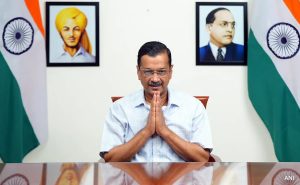
During the bail hearing, Kejriwal’s legal team, led by senior lawyer Abhishek Manu Singhvi, made a strong case for his release, pointing out that most of the co-accused in the case, including former Deputy Chief Minister Manish Sisodia, had already been granted bail. Singhvi argued that keeping Kejriwal in custody without any substantial evidence linking him directly to the corruption charges was unjustified.
Furthermore, Kejriwal’s defense emphasized his long-standing cooperation with the investigation and his commitment to answering all charges in court. Singhvi argued that pre-trial detention should not be used as a form of punishment, especially when there is no direct evidence of wrongdoing.
The prosecution, however, contended that Kejriwal’s involvement in the case was more extensive than the defense claimed. The CBI argued that Kejriwal was the mastermind behind the excise policy, which allegedly allowed certain liquor traders to gain undue advantages. Despite these arguments, the court decided that prolonged detention would be a violation of Kejriwal’s personal liberty, particularly given the slow pace of the trial.
Political Implications: What This Means for AAP and Kejriwal
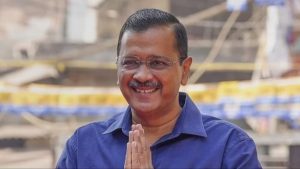
The bail decision is a significant political victory for Arvind Kejriwal and the AAP, but it does not mark the end of the challenges facing them. Kejriwal’s prolonged absence from the political scene has already had an impact on AAP’s governance and its national ambitions. While his release will allow him to return to his duties as Delhi Chief Minister, the ongoing trial will continue to cast a shadow over his leadership.
The Delhi excise policy case has damaged AAP’s reputation, particularly because the party built its political brand on the promise of clean governance and a fight against corruption. Kejriwal, who rose to prominence as an anti-corruption crusader during the 2011 India Against Corruption movement, now finds himself in a precarious position, with his own integrity being questioned.
Moreover, Kejriwal’s political rivals, particularly the Bharatiya Janata Party (BJP), are likely to continue using the case to attack AAP. The BJP has already framed the excise policy scandal as an example of AAP’s failure to live up to its anti-corruption promises, and Kejriwal’s bail is unlikely to quell these criticisms.
Conclusion: A Fragile Victory
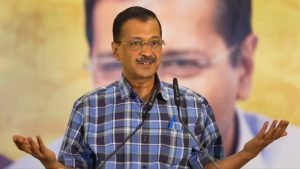
Arvind Kejriwal’s release on bail is undoubtedly a relief for his supporters and a reprieve for the AAP government. However, the stringent conditions imposed by the Supreme Court indicate that Kejriwal’s legal troubles are far from over. As the trial continues, the outcome of the case will have a significant impact on both Kejriwal’s political future and the broader trajectory of AAP as a national party. For now, the Delhi Chief Minister must navigate a complex legal and political landscape, with the shadow of the excise policy case looming large over his career.
YOU MAY ALSO READ: Viral Incident in Chhattisgarh: Schoolgirls Drinking Beer in Classroom



